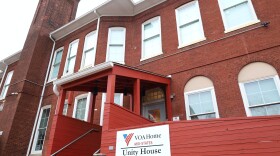Apryll Buege spent much of her youth in the foster care system. She said she got in some trouble, made some mistakes, but soon realized she needed to pull her life together.
How to do that, though, wasn't so clear.
When the now 20-year-old left the foster care system, she didn't have a permanent place to live. She briefly stayed with an old boyfriend, but it didn't work out. She tried staying with another friend. Again, it didn't work out.
"I didn't know where to go," she said.
Then, she found out about and took part in a program that provides affordable housing to people with little or no income.
Now, Buege lives in a small two-bedroom apartment in south Louisville.
Without that program, she would "probably be homeless," she said.
A proposed initiative announced Friday aims to expand efforts to provide affordable housing to financially struggling Louisville residents.
Under the $12-million plan, 1,500 affordable housing units would be created within two years, Mayor Greg Fischer said at a press conference Friday.
The need for the initiative, Fischer said, is evident in the numbers. Nearly 1,700 homes in Louisville lack a complete kitchen or plumbing; about 6,800 JCPS students lacked permanent housing in the 2013-2014 school year; as many as 1,200 residents are homeless in Louisville on "any given night," he said.
U.S. Census data shows that nearly 60,000 households in Louisville spend more than 30 percent of their income on housing, and nearly 24,000 of those households spend at least 50 percent of their income on housing.
Families that pay more than 50 percent of their income on rent will be the focus of the initiative, Fischer said.
"These are families that live paycheck to paycheck, one paycheck away from a major problem," he said.
He said the push to create more affordable housing in Louisville has a good social return on the investment, and it can help improve the city's economy.
"We cannot create the quality workforce that businesses require if our workers don't have a stable home in which to raise their family," he said.
The program will include a $10-$11 million revolving loan pool that non-profit and for-profit developers can tap to build multi-family housing units across the city. That money will come via a 30-year bond, Fischer said.
"These loans are available for developers to build affordable housing," Fischer said. They will not provide "direct assistance" to home buyers or renters, he added.
The Affordable Housing Trust Fund will help develop parameters for the loans and review applications. The loans will be administered by Develop Louisville's Office of Housing and Community Development.
An additional $1 million in city funds will be set aside to buy land for construction of housing near major employment centers.
About 750 new affordable housing units are projected to be created in the first two years, according to a city press release. This will free up about 750 additional units for other families working their way out of poverty.
Mary Ellen Wiederwohl, chief of the economic development agency Louisville Forward, said loan funds are set to begin being awarded by early to mid-2016.
Metro Council President David Tandy, a Democrat from District 4, said city officials will also be looking into the land development code so "affordable housing can go everywhere in Jefferson County."
"It is vital," he said. "For communities to be upwardly mobile that they have to have access to all parts of community."
He also acknowledged that funding for the initiative is dependent on Metro Council approval.
Fischer will present the initiative to the council on May 28 as part of his 2015-2016 fiscal year budget proposal.
Tandy said "a number of colleagues of mine on the council" have expressed interest of support for boosting affordable housing.
He said he will work to ensure that all aspects of the initiative, including the bond structure and nearly $7 million in additional funds geared towards housing, will remain in the budget.
Tandy said the initiative can help prove the need for a one percent insurance premium tax that advocates have pushed for to help fund the Affordable Housing Trust Fund.
He said this can help prove the "business case" of the tax.
Cathy Hinko, director of the Metropolitan Housing Coaltion, stood smiling behind Fischer during the Friday morning announcement at the Woodbourne House in the Highlands-Douglass neighborhood.
She said she's happy to see the city push to boost affordable housing in the area.
But she said this plan won't be a silver bullet.
"Does this obviate the need for a trust fund with a dedicated, renewable, public source of funding," she asked. "No."
Like Tandy, she hopes this will make the case that there is "much more opportunity than we have money."
"This is an investment," she added. "Not a handout."
That's how Apryll Buege sees it, too.
Since finding a place to live that she can afford—she makes about $900 a month as a veterinary technician and rent subsidies allow her to pay just about $250 month for her apartment—she's been able to get into school and think about the future.
She wants to be a science teacher. When she talks about where she might want to live in the coming years, she keeps the focus on Louisville.
"It's got everything," she said. "It's close to schools, I can get a job."






